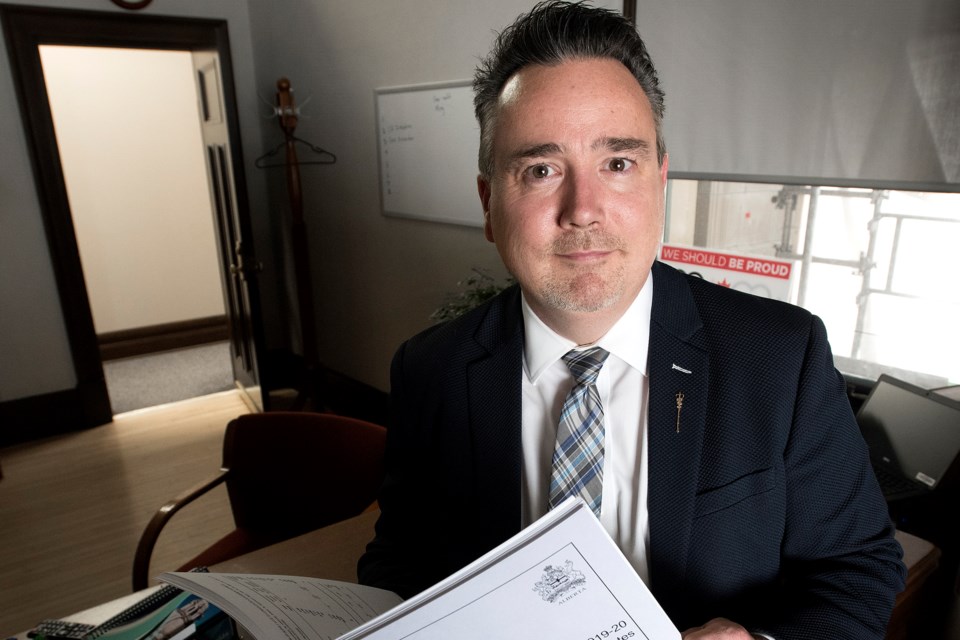Alberta’s ministries will soon have to track the amount of red tape that they create, but a new rule mandating the province approve federal funding agreements for schools, health agencies and municipalities will not be included in those figures.
That’s according to Red Tape Reduction Minister Dale Nally, who tabled Bill 16, the Red Tape Reduction Statutes Amendment Act. The bill, passed last month, will require ministries to do an annual count of their red tape and report what they have done to reduce it.
Bill 18, the Provincial Priorities Act, passed last month, but received criticism from some municipalities, post-secondaries and experts who said it will create more red tape when it comes to forging deals with the feds, intrude on municipal priorities and threaten academic freedom.
But Nally, who is also MLA for Morinville-St. Albert, said the new legislation does not count as red tape because it will help Alberta get a better deal in negotiations with the federal government. Albertans are not getting a fair portion of funding from the feds, and the Provincial Priorities Act is about “repatriating money that Albertans are entitled to,” he said.
“People often don't understand the difference between red tape and responsible regulation,” Nally said. “There is a role for regulation that keeps our air clean and our water fresh. We embrace the actual definition of red tape, which is unnecessary regulation and duplication of regulation.”
The Provincial Priorities Act is necessary and appropriate, he said.
Bill 20, the Municipal Affairs Statutes Amendment Act, another controversial piece of legislation that will introduce political parties to municipal elections in Calgary and Edmonton, give the province more power to remove municipal leaders, undo municipal bylaws, and ban voting tabulators in municipal elections, does not introduce red tape for similar reasons, according to Nally.
Some municipal leaders have criticized the province’s demand for hand counting as an extra burden that will cost more money. But Nally said it is necessary because some Albertans don’t have faith in the tabulators.
“Albertans have asked for transparency, when it comes to elections, and nothing is more transparent than the hand counting of ballots,” he said. “That's why when it comes to recounts, we do recounts manually, because it’s more accurate, and it's more transparent.”
Spring legislature sitting wraps up
The spring legislative session ended last week, and Nally said he is particularly happy with his ministry's work to regulate Alberta’s life lease industry.
Bill 12, the Consumer Protection (Life Leases) Amendment Act, would penalize life lease operators with large fines and potential jail time for not paying back leaseholders, and increase transparency around how operators are spending the loans.
Life leases are large loans paid to property owners for reduced rent, typically in seniors’ housing. Leaseholders in buildings owned by the Christenson Group of Companies have been awaiting loan repayment for years, in some cases.
Leaseholders were initially unhappy with the bill and protested the fact it doesn’t mandate life lease loan money be held in a trust or make penalties retroactive. But since meeting with Nally and Premier Danielle Smith in April, the group has signalled it is feeling more confident about the legislation.
“[The NDP] were upset that there was no retroactivity, but they know that you can't make legislation involving contracts retroactive,” Nally said. “Government cannot create legislation that will open up contracts from the past … this legislation was always about, ‘How do we make sure this never happens again?’”
Nally also criticized the NDP’s focus on Bills 18 and 20.
“Very little of what they actually had to say about those bills was true,” he said. “In fact, in most cases, very few of them came out to vote on it.”
The UCP limited debate on Bills 18 and 20 and two other pieces of legislation, one that will move provincial elections to the fall and another that will pave the way for the province to split Alberta Health Services into four new health agencies. The NDP called the one-hour time limit anti-democratic.
UCP consolidating power, Renaud says
St. Albert MLA Marie Renaud said the spring 2024 legislative session was marked by the UCP government’s attempts to consolidate power, particularly with bills aimed at controlling federal agreements and bolstering the province’s authority over municipalities.
“It’s really shocking when you look what the UCP presented as a platform, and then what they ended up doing,” she said. “One of their big pieces was the affordability action plan, and we saw that crumble and collapse as soon as they were re-elected. We don't have the savings at the gas pump. We don't have the electricity savings, although prices are changing. We don't have the affordability payments.”
Renaud pointed to large omnibus bills that she called a “firehose of ugly legislation” with “a few good pieces” thrown in to discredit the NDP for not lending support.
She also singled out legislation around life leases, which she feels does not put enough pressure on operators who have not repaid former tenants.
The spring session also marked Rachel Notley’s departure as NDP party leader, and Renaud said she is “grateful for Notley’s leadership.”
“[Notley] gave us a really safe working environment, a really stable place to learn our jobs,” Renaud said. “She also changed Alberta in ways I think we’ll be talking about for decades … Alberta is a young, progressive, educated place, and I think that we very clearly demonstrated that we're not just a conservative province.”
Voting for a new NDP leader started Monday, and party members have until June 22 to cast their votes.



